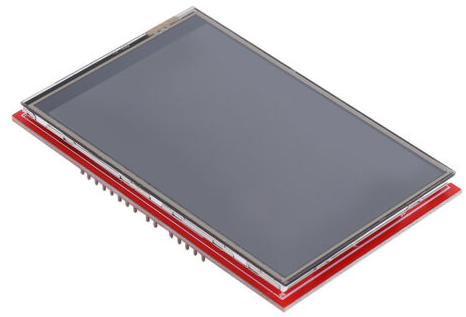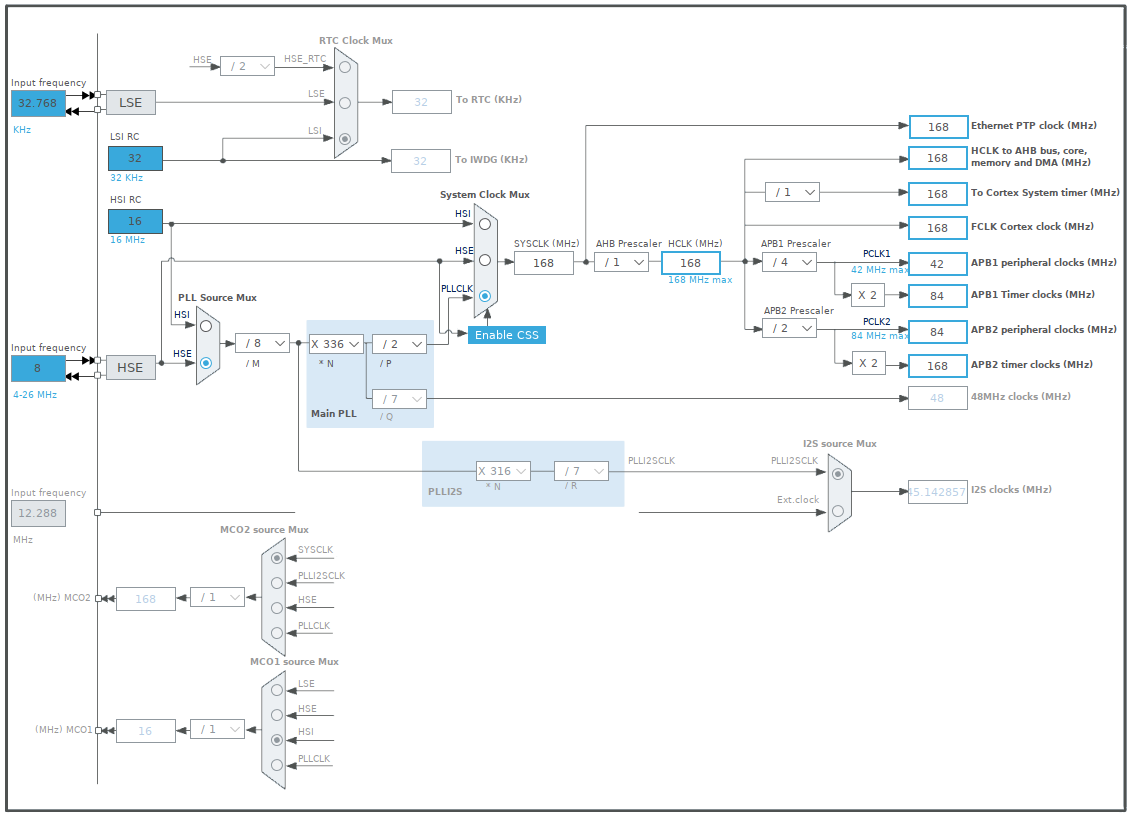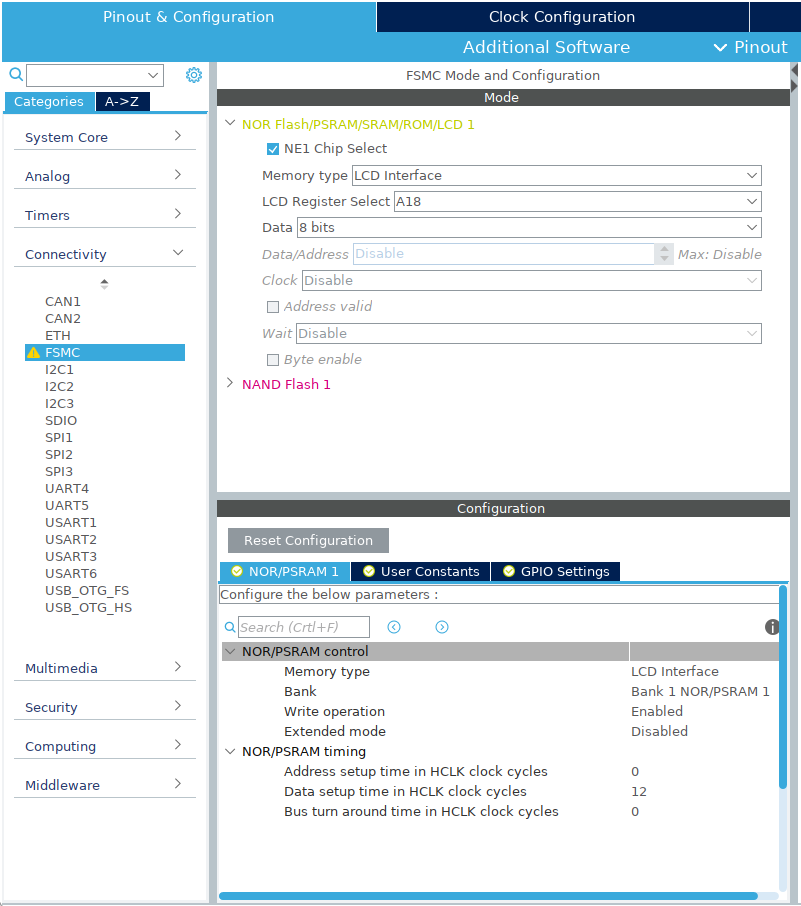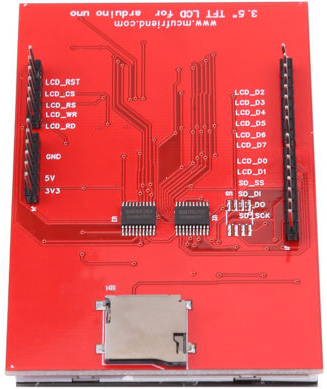3.5" inch TFT LCD Display Module 480X320 driven with FSMC.
TFT LCD Display Module 480X320 driven with FSMC
I have recently bought a 3.5" inch TFT LCD Touch Screen Display Module 480X320 with a www.mcufriend.com label on the back side. The display was equipped with an 8bit parallel interface. First I decided to test it with the UniGraphic library using the BUS_8 protocol. The display was very slow but improved when I switched to the PAR_8 protocol. Because I heard about the possibility to use a Flexible Static Memory Controller (FSMC), built into some STM MCU's, to drive LCD's (read/write to LCD's memory rather than to an external SRAM) I thought it would be a fun to try it out.

Below is the brief story of what I did:
- Created a project for my STM32F407VE board in the STM32CubeIDE
- Set the
Clock Configurationto match the one used by Mbed for the Seeed Arch Max board:
- Selected
FSMCin theConnectivitycategory and configured it as below:
- Let the
STM32CubeIDEgenerate the code (files). - Created a new program for the Seeed Arch Max target in the Mbed Online Compiler by selecting a
mbed os blinkytemplate. - Replaced the
main.cppwith themain.ccontent of theSTM32CubeIDEproject. Copy & Pastedthe other files with codes from theSTM32CubeIDEproject to the online compiler project.- Renamed and modified:
"stm32f4xx_it.h" to "stm32f4xx_it_msp.h"
"stm32f4xx_it.c" to "stm32f4xx_it_msp.c" - Added the UniGraphic library to the online compiler project.
- Extended the
UniGraphiclibrary with aFSMC_8protocol and replaced theTFT::set_orientation(int orient)function with the one used bymcufriendfor arduino. - Modified the
main.cppas needed.
 |  |
Wiring
| STM32F407VE | TFT LCD module |
|---|---|
| +3.3V | 3V3 |
| GND | GND |
| PB_12 | LCD_RST |
| GND | LCD_CS |
| PD_13 (RS) | LCD_RS |
| PD_5 (WR) | LCD_WR |
| PD_4 (RD) | LCD_RD |
| PD_14 (DB00) | LCD_D0 |
| PD_15 (DB01) | LCD_D1 |
| PD_0 (DB02) | LCD_D2 |
| PD_1 (DB03) | LCD_D3 |
| PE_7 (DB04) | LCD_D4 |
| PE_8 (DB05) | LCD_D5 |
| PE_9 (DB06) | LCD_D6 |
| PE_10 (DB07) | LCD_D7 |
Results
| Execution times | ||
|---|---|---|
| Used protocol | BUS_8 | FSMC_8 |
| Operation \ Time | ms | ms |
| Clear | 2283.980 | 38.454 |
| Plot | 192.066 | 11.365 |
| 8bit BMP | 63.805 | 41.338 |
| Large Font | 163.872 | 7.895 |
| Sparce pixels | 2072.265/1458.051 | 74.107/52.168 |
| 16bit BMP | 2288.589 | 59.904 |
UniGraphic/Protocols/I2C_bus.cpp
- Committer:
- hudakz
- Date:
- 2020-05-10
- Revision:
- 0:fa952828e34c
File content as of revision 0:fa952828e34c:
/* mbed UniGraphic library - I2C protocol class
* Copyright (c) 2017 Peter Drescher
* Released under the MIT License: http://mbed.org/license/mit
*
* THE SOFTWARE IS PROVIDED "AS IS", WITHOUT WARRANTY OF ANY KIND, EXPRESS OR
* IMPLIED, INCLUDING BUT NOT LIMITED TO THE WARRANTIES OF MERCHANTABILITY,
* FITNESS FOR A PARTICULAR PURPOSE AND NONINFRINGEMENT. IN NO EVENT SHALL THE
* AUTHORS OR COPYRIGHT HOLDERS BE LIABLE FOR ANY CLAIM, DAMAGES OR OTHER
* LIABILITY, WHETHER IN AN ACTION OF CONTRACT, TORT OR OTHERWISE, ARISING FROM,
* OUT OF OR IN CONNECTION WITH THE SOFTWARE OR THE USE OR OTHER DEALINGS IN
* THE SOFTWARE.
*/
#include "I2C_bus.h"
I2C_bus::I2C_bus(int Hz, int address, PinName sda, PinName scl)
: _i2c(sda,scl)
{
_i2c.frequency(Hz);
_address = address;
//hw_reset();
}
void I2C_bus::wr_cmd8(unsigned char cmd)
{
char tmp[2];
tmp[0] = 0x00; //command
tmp[1] = cmd;
_i2c.write(_address,tmp,2);
}
void I2C_bus::wr_data8(unsigned char data)
{
_i2c.write(data); // write 8bit
}
void I2C_bus::wr_cmd16(unsigned short cmd)
{
char tmp[3];
tmp[0] = 00; //command
tmp[1] = cmd>>8;
tmp[2] = cmd&0xFF;
_i2c.write(_address,tmp,3);
}
void I2C_bus::wr_data16(unsigned short data)
{
_i2c.write(data>>8); // write 8bit
_i2c.write(data&0xFF); // write 8bit
}
void I2C_bus::wr_gram(unsigned short data)
{
_i2c.write(data>>8); // write 8bit
_i2c.write(data&0xFF); // write 8bit
}
void I2C_bus::wr_gram(unsigned short data, unsigned int count)
{
_i2c.start();
_i2c.write(_address);
_i2c.write(0x40); // data continue
if((data>>8)==(data&0xFF))
{
count<<=1;
while(count)
{
_i2c.write(data); // write 8bit
count--;
}
}
else
{
while(count)
{
_i2c.write(data>>8); // write 8bit
_i2c.write(data&0xFF); // write 8bit
count--;
}
}
_i2c.stop();
}
void I2C_bus::wr_grambuf(unsigned short* data, unsigned int lenght)
{
_i2c.start();
_i2c.write(_address);
_i2c.write(0x40); // data continue
while(lenght)
{
_i2c.write((*data)>>8); // write 8bit
_i2c.write((*data)&0xFF); // write 8bit
data++;
lenght--;
}
_i2c.stop();
}
void I2C_bus::hw_reset()
{
}
void I2C_bus::BusEnable(bool enable)
{
}
void I2C_bus::reg_select(unsigned char reg, bool forread)
{
}
unsigned int I2C_bus::rd_reg_data32(unsigned char reg)
{
return 0;
}
unsigned int I2C_bus::rd_extcreg_data32(unsigned char reg, unsigned char SPIreadenablecmd)
{
return 0;
}
void I2C_bus::dummyread()
{
}
unsigned short I2C_bus::rd_gram(bool convert)
{
return (0);
}
unsigned short I2C_bus::reg_read(unsigned char reg)
{
return (0);
}
void I2C_bus::reg_write(unsigned char reg, unsigned short data)
{
}